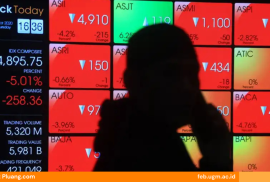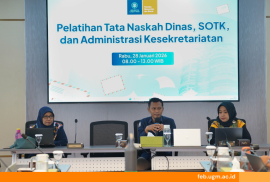One of our most esteemed alumni and professors is none other than Prof. Boediono, a name that resonates with every Indonesian. As the 11th Vice President of Indonesia, his achievements prove the quality of education at the Economics Study Program, FEB UGM.
Apart from Prof. Boediono, the Economics Study Program at FEB UGM has produced thousands of alums who have successfully worked in various fields of life. The Economics Study Program has promising job prospects, and the demand for graduates in multiple sectors is relatively high. Unsurprisingly, many new students choose to major in Economics when continuing their higher education because of the broad job prospects in government institutions, the private sector, state-owned companies, researchers, and many others.
Every year, prospective new students in each of the UGM selection routes seek the Economics study program. In 2023, the number of applicants for this program reached 2,851 people with a selectivity of 1:24. This means that only one out of 24 applicants is accepted. The selectivity to enter this program is relatively high, with an acceptance rate of 5 percent.
This program is known for its strong academic reputation and ability to maintain quality on an ongoing basis. This is evidenced by its Superior accreditation by the National Accreditation Board for Higher Education (BAN-PT). In addition, the Economics Study Program is one of the programs at FEB UGM that is included in the scope of accreditation by the Association to Advance Collegiate Schools of Business (AACSB). In fact, in the QS WUR ranking results by subject 2024, this program is ranked 151-200 globally.
Head of the Undergraduate in Economics Study Program, FEB UGM, Sekar Utami Setiastuti, Ph.D., said the Economics Study Program, FEB UGM, is relatively unique. Although it belongs to the social humanities cluster, the Economics Study Program students not only learn to understand social phenomena but also use a quantitative approach. Students in the Economics Study Program need to study mathematics as a tool for analyzing economic theory. In addition, understanding mathematics is required to support financial decision-making through statistical data processing. A strong understanding of mathematics is essential to producing competitive graduates internationally. Several foreign universities, such as Princeton, MIT, Brown, NYU, Yale, and Columbia, have included Econometrics and Quantitative Economics in the STEM (Science, Technology, Engineering and Mathematics) category.
Sekar said the Economics Study Program has the vision to become the best undergraduate economics study program in Indonesia and Southeast Asia in advancing education and science, especially economics. The resulting graduates are expected to master critical thinking skills and strong analysis in solving problems.
The FEB UGM Economics study program has the advantage of developing the latest curriculum that is continuously updated by global economic dynamics. Currently, this program is preparing a new curriculum in line with the new vision and mission of FEB UGM as a sustainable campus.
“In the 2024 curriculum, we will open two new courses, namely Circular Economy and Earth Balance and Sustainability. “These two courses will complement the portfolio of environment-related courses, which previously included Environmental Economics and Energy Economics,” she explained on Monday (5/20).
Apart from presenting sustainability aspects in his courses as an effort to develop future leaders in economics and business to build sustainability aspects, Sekar said that FEB UGM Economics Study Program also provides experiences for International Undergraduate Program (IUP) students to gain international exposure. This is achieved through double degree programs and exchange programs with several partner universities abroad, such as the University of Melbourne, Erasmus School of Economics (Rotterdam), University of Groningen, University of Hull, Saxion University of Applied Sciences and Hochschule Pforzheim. Through this program, students are expected to gain diverse learning experiences while expanding their international networks.
As part of FEB UGM, this study program has international cooperation with more than 40 global partner universities. One of them, the FEB UGM Economics Study Program, has become part of the Partnership of Asian Management Schools (PAMS) since 2020, and it offers short academic programs at external universities. FEB UGM collaborates with four partner universities: Woosong University, Foreign Trade University, Sun Yat-sen University and Universiti Kebangsaan Malaysia.
Rizqi Akhyar Prasetya, a student from the Economics Study Program Class of 2021, said he had a comprehensive learning experience during his lectures. The knowledge gained is not only focused on in-depth theory, but several courses such as Development Economics, Public Economics, and others also discuss practical applications in various real-world contexts.
Rizqi said there was one unique thing he felt only after becoming an economics student: the multidisciplinary approach used and the use of solid mathematical analysis for each course. As someone who previously majored in social sciences, I find survival challenging. “But on the other hand, I am proud of it because this distinguishes economics from other social science programs. “We are very mathematical here, and for some people, that feels cool,” he explained.
Rizqi admitted that he also had many opportunities to get involved in various non-academic activities and student organizations. This is very useful for developing soft skills such as leadership and communication. “I have served in various organizations and committees several times, which has given me a lot of experience, relationships, and skills that have improved over time,” he said.
Reportage: Kurnia Ekaptiningrum
Sustainable Development Goals








